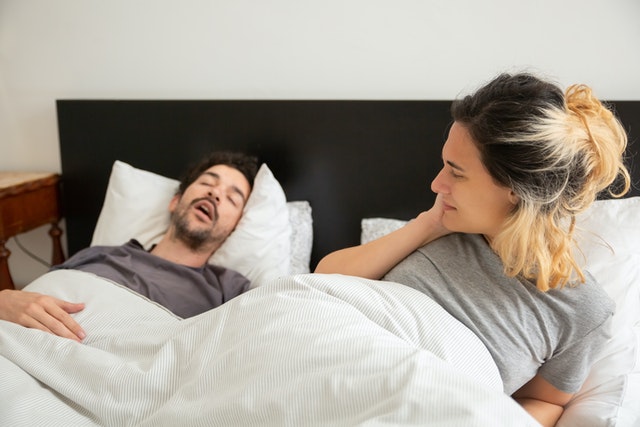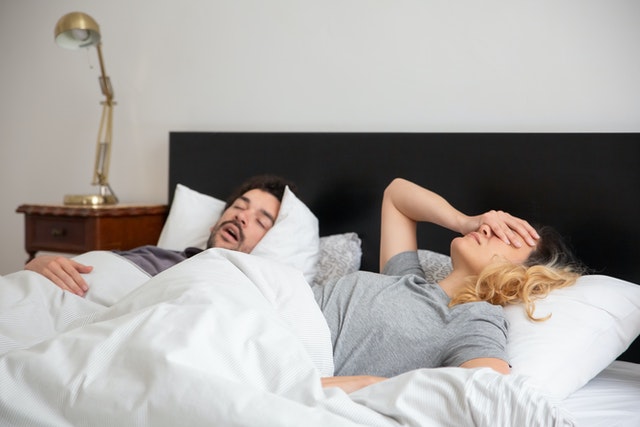This article will give detailed information about the causes of snoring, symptoms, snoring during pregnancy, and treatment. Keep reading!
A blockage causes snoring in the airways. Relaxation of the body during sleep also causes the throat to relax. Thus, either the loosened soft palate in the throat begins to flutter, or the back of the tongue falls back and vibrates with the inhaled air.
There can be many different factors among the causes of snoring. Nasal congestion, sleeping on your back, obesity, genetic predisposition, alcohol consumption, certain medications, and respiratory diseases are common causes of snoring.

A person who snores often lacks restful and restful sleep. Both loud noises and a lack of oxygen often wake the snorer and cause a change in position.
There are many different methods for the treatment of snoring. However, some lifestyle changes and home remedies can help you control snoring better.
What are the symptoms of snoring?
Signs of snoring require significant attention, and it may represent a more or less sizeable acoustic load for the affected person and their environment. Snoring can also be a problem for those affected. For example, many issues may occur, such as trouble falling asleep and staying asleep, morning headaches, dry mouth, loss of concentration or performance, and a tendency to fall asleep with daytime sleepiness. To understand the symptoms, you can examine in detail the information we provide about what causes snoring.
These are the first signs that snoring isn’t a simple condition. Obstructive sleep apnea (OSA) is present, which can also cause severe discomfort or illness.
Snoring treatment
We answered the question of what causes snoring. Now we will list the most effective treatment methods.
There are many methods you can apply for the treatment of snoring. This problem isn’t understood as a disease with a medical risk in itself. For this reason, no treatment is needed unless you request it. There are several questionable therapy methods to combat snoring. In individual cases, you should carefully weigh the efficacy and risks against each other. You can opt for non-invasive or minimally invasive procedures.
Medical, natural, or herbal snoring treatments that you can refer to can be:
Conservative treatments
- Avoiding sleeping pills
- Avoiding alcohol consumption in the evening
- Nicotine withdrawal
- Maintaining a stable sleep-wake cycle with proper sleep hygiene
- Losing weight
- Not eating heavy meals before going to bed
- Strengthening the muscles of the floor of the mouth (for example, through electrical stimulation, singing exercises, or targeted speech exercises)
- Preventing the prone position in cases of snoring caused by the utterly supine position
- Height of upper body
- Nasal opening expanders (nasal entrance dilators) (especially in cases where the source of nasal obstruction is in the nasal valve region)
- Decongestant nasal sprays: Not suitable for long-term use due to potential damage to mucous membranes, but can be used to simulate the effect of a prior nasal surgery;
- Systemically used drugs such as pseudoephedrine, domperidone or proscription may be effective. However, it has significant side effects and is not yet approved for the treatment of snoring.
- Positive pressure breathing (CPAP): It usually eliminates snoring but is rarely used due to its potential side effects and high cost.
Snoring device
Types of snoring apparatus you can use:
- Mandibular protrusion splint: Special devices that can be placed in the oral cavity, especially mandibular protrusion splints, can be used to treat snoring. They are aimed at expanding the pharynx by moving the lower jaw forward. Possible side effects are increased salivation, complaints in the chewing muscles and jaw joint area, and prolonged changes in the position of the teeth. For this reason, splint adjustment and normal controls of teeth and jaw findings during treatment with mandibular protrusion splints should be made by a dentist.
- Snoring corset: It splints the soft palate and prevents snoring sounds in the quiet palate area. The snoring brace also prevents blockages in the middle and upper pharynx. In most cases, respiratory pauses and sleep apnea (if occurring on the soft palate) are reduced.
Surgical treatment
When it comes to surgical treatment for snoring, it’s always necessary to weigh whether there is a single cause or more than one. Operations in the nose, palate, and tongue root are possible.
It’s a modern, minimally invasive treatment in which only scars are created under the mucous membrane (radio frequency dependent thermotherapy, RFITT). However, the effect usually wears off as the tissue heals, and in these cases, therapy can be repeated.
Herbal remedies for snoring
- Steam bath
- Garlic
- Honey
- Mint
- Olive oil
Steam bath
Nasal congestion is one of the leading causes of snoring. Steam baths help clear nasal congestion and make breathing easier. It’s beneficial for snoring during pregnancy. The steam goes directly to the respiratory tract, loosening the irritating secretions and thus opening the airway.
For this, pour about 1 liter of boiling water into a large container. Add 3 to 4 drops of eucalyptus oil or tea tree oil. Cover your head and bowl with a towel (no steam escapes) and inhale the rising steam deeply through your nose for 10 minutes. Take a steam bath daily before going to bed.
Garlic
Garlic clears congestion in the airways and helps snorers with sinus congestion. It helps reduce mucus in the nasal passages and fights inflammation in the airways, and it works almost as an anti-snoring.
For this, peel and crush 1-2 cloves of raw garlic. Squeeze half a lemon and mix with warm water. Put the garlic in your mouth, chew it well and rinse with lemon water. Repeat the application about 1 hour before going to bed every day.
Honey
Honey has an anti-inflammatory effect and kills germs. It helps reduce swelling around the neck, helps against the constriction of the airways, and improves oxygen supply for snorers.
Add 1 tablespoon of honey to 1 glass of warm water or herbal tea and drink it before bed. Repeat daily.
Mint
Peppermint is perfect as an anti-snoring, and it has anti-inflammatory properties that reduce swelling of the membranes in the throat and nose. Peppermint also helps with temporary snoring caused, for example, by allergies, cold or dry air.
To use peppermint oil, add 1-2 drops of peppermint oil to a glass of water and gargle the solution before going to bed.
Important note: You should never swallow the solution.
Another option is to rub some peppermint oil under your nose before going to bed. For this, first, moisten a cotton ball with water, then a few drops of peppermint oil, and apply it to the lower part of the nose. This will slightly dilute the peppermint oil.
If the weather is dry, ventilate the bedroom for 30 minutes in a humidifier with a few drops of peppermint or eucalyptus oil.
Olive oil
Olive oil helps reduce vibrations in the throat. The anti-inflammatory properties of olive oil reduce airway swelling, lighten tissues along the airways and provide a clear pathway for air supply.
Consume 1 tablespoon of olive oil before going to bed. Alternatively, ½ teaspoon of olive oil can be mixed with ½ teaspoon of honey. Repeat the application daily before going to bed.
Anti-snoring methods
- Don’t drink alcohol for at least 2 hours before going to bed. Alcohol can cause snoring by damaging the central nervous system.
- Sing before going to bed. Singing strengthens the muscles of the soft palate and upper throat.
- Stop smoking. Smoking irritates the throat and obstructs the airways.
- If you are overweight, lose weight. Increased fat accumulation can further narrow the airways.
- Sleeping on your back often causes the back of the tongue to drop back and narrow the airway.
Many home remedies help snorers. If we integrate only 1 or 2 of the home remedies into our daily life, we can spend the night more peacefully and peacefully.
Sources:
https://www.ncbi.nlm.nih.gov/pmc/articles/PMC4389504/
https://pubmed.ncbi.nlm.nih.gov/9194872/

